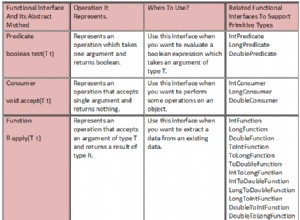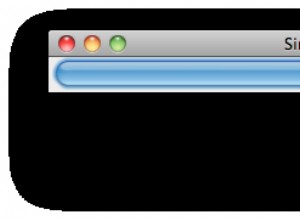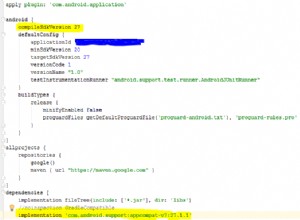Hvordan opretter man asynkrone stacktraces?
Da dette spørgsmål ikke har modtaget nogen svar i næsten en måned, vil jeg poste den bedste løsning, jeg har fundet til dato:
DebugCompletableFuture.java :
/**
* A {@link CompletableFuture} that eases debugging.
*
* @param <T> the type of value returned by the future
*/
public final class DebugCompletableFuture<T> extends CompletableFuture<T>
{
private static RunMode RUN_MODE = RunMode.DEBUG;
private static final Set<String> CLASS_PREFIXES_TO_REMOVE = ImmutableSet.of(DebugCompletableFuture.class.getName(),
CompletableFuture.class.getName(), ThreadPoolExecutor.class.getName());
private static final Set<Class<? extends Throwable>> EXCEPTIONS_TO_UNWRAP = ImmutableSet.of(AsynchronousException.class,
CompletionException.class, ExecutionException.class);
private final CompletableFuture<T> delegate;
private final AsynchronousException asyncStacktrace;
/**
* @param delegate the stage to delegate to
* @throws NullPointerException if any of the arguments are null
*/
private DebugCompletableFuture(CompletableFuture<T> delegate)
{
requireThat("delegate", delegate).isNotNull();
this.delegate = delegate;
this.asyncStacktrace = new AsynchronousException();
delegate.whenComplete((value, exception) ->
{
if (exception == null)
{
super.complete(value);
return;
}
exception = Exceptions.unwrap(exception, EXCEPTIONS_TO_UNWRAP);
asyncStacktrace.initCause(exception);
filterStacktrace(asyncStacktrace, element ->
{
String className = element.getClassName();
for (String prefix : CLASS_PREFIXES_TO_REMOVE)
if (className.startsWith(prefix))
return true;
return false;
});
Set<String> newMethods = getMethodsInStacktrace(asyncStacktrace);
if (!newMethods.isEmpty())
{
Set<String> oldMethods = getMethodsInStacktrace(exception);
newMethods.removeAll(oldMethods);
if (!newMethods.isEmpty())
{
// The async stacktrace introduces something new
super.completeExceptionally(asyncStacktrace);
return;
}
}
super.completeExceptionally(exception);
});
}
/**
* @param exception an exception
* @return the methods referenced by the stacktrace
* @throws NullPointerException if {@code exception} is null
*/
private Set<String> getMethodsInStacktrace(Throwable exception)
{
requireThat("exception", exception).isNotNull();
Set<String> result = new HashSet<>();
for (StackTraceElement element : exception.getStackTrace())
result.add(element.getClassName() + "." + element.getMethodName());
for (Throwable suppressed : exception.getSuppressed())
result.addAll(getMethodsInStacktrace(suppressed));
return result;
}
/**
* @param <T2> the type returned by the delegate
* @param delegate the stage to delegate to
* @return if {@code RUN_MODE == DEBUG} returns an instance that wraps {@code delegate}; otherwise, returns {@code delegate}
* unchanged
* @throws NullPointerException if any of the arguments are null
*/
public static <T2> CompletableFuture<T2> wrap(CompletableFuture<T2> delegate)
{
if (RUN_MODE != RunMode.DEBUG)
return delegate;
return new DebugCompletableFuture<>(delegate);
}
/**
* Removes stack trace elements that match a filter. The exception and its descendants are processed recursively.
* <p>
* This method can be used to remove lines that hold little value for the end user (such as the implementation of utility functions).
*
* @param exception the exception to process
* @param elementFilter returns true if the current stack trace element should be removed
*/
private void filterStacktrace(Throwable exception, Predicate<StackTraceElement> elementFilter)
{
Throwable cause = exception.getCause();
if (cause != null)
filterStacktrace(cause, elementFilter);
for (Throwable suppressed : exception.getSuppressed())
filterStacktrace(suppressed, elementFilter);
StackTraceElement[] elements = exception.getStackTrace();
List<StackTraceElement> keep = new ArrayList<>(elements.length);
for (StackTraceElement element : elements)
{
if (!elementFilter.test(element))
keep.add(element);
}
exception.setStackTrace(keep.toArray(new StackTraceElement[0]));
}
@Override
public <U> CompletableFuture<U> thenApply(Function<? super T, ? extends U> fn)
{
return wrap(super.thenApply(fn));
}
@Override
public <U> CompletableFuture<U> thenApplyAsync(Function<? super T, ? extends U> fn)
{
return wrap(super.thenApplyAsync(fn));
}
@Override
public <U> CompletableFuture<U> thenApplyAsync(Function<? super T, ? extends U> fn, Executor executor)
{
return wrap(super.thenApplyAsync(fn, executor));
}
@Override
public CompletableFuture<Void> thenAccept(Consumer<? super T> action)
{
return wrap(super.thenAccept(action));
}
@Override
public CompletableFuture<Void> thenAcceptAsync(Consumer<? super T> action)
{
return wrap(super.thenAcceptAsync(action));
}
@Override
public CompletableFuture<Void> thenAcceptAsync(Consumer<? super T> action, Executor executor)
{
return wrap(super.thenAcceptAsync(action, executor));
}
@Override
public CompletableFuture<Void> thenRun(Runnable action)
{
return wrap(super.thenRun(action));
}
@Override
public CompletableFuture<Void> thenRunAsync(Runnable action)
{
return wrap(super.thenRunAsync(action));
}
@Override
public CompletableFuture<Void> thenRunAsync(Runnable action, Executor executor)
{
return wrap(super.thenRunAsync(action, executor));
}
@Override
public <U, V> CompletableFuture<V> thenCombine(CompletionStage<? extends U> other,
BiFunction<? super T, ? super U, ? extends V> fn)
{
return wrap(super.thenCombine(other, fn));
}
@Override
public <U, V> CompletableFuture<V> thenCombineAsync(CompletionStage<? extends U> other,
BiFunction<? super T, ? super U, ? extends V> fn)
{
return wrap(super.thenCombineAsync(other, fn));
}
@Override
public <U, V> CompletableFuture<V> thenCombineAsync(CompletionStage<? extends U> other,
BiFunction<? super T, ? super U, ? extends V> fn,
Executor executor)
{
return wrap(super.thenCombineAsync(other, fn, executor));
}
@Override
public <U> CompletableFuture<Void> thenAcceptBoth(CompletionStage<? extends U> other,
BiConsumer<? super T, ? super U> action)
{
return wrap(super.thenAcceptBoth(other, action));
}
@Override
public <U> CompletableFuture<Void> thenAcceptBothAsync(CompletionStage<? extends U> other,
BiConsumer<? super T, ? super U> action)
{
return wrap(super.thenAcceptBothAsync(other, action));
}
@Override
public <U> CompletableFuture<Void> thenAcceptBothAsync(CompletionStage<? extends U> other,
BiConsumer<? super T, ? super U> action,
Executor executor)
{
return wrap(super.thenAcceptBothAsync(other, action, executor));
}
@Override
public CompletableFuture<Void> runAfterBoth(CompletionStage<?> other, Runnable action)
{
return wrap(super.runAfterBoth(other, action));
}
@Override
public CompletableFuture<Void> runAfterBothAsync(CompletionStage<?> other, Runnable action)
{
return wrap(super.runAfterBothAsync(other, action));
}
@Override
public CompletableFuture<Void> runAfterBothAsync(CompletionStage<?> other, Runnable action, Executor executor)
{
return wrap(super.runAfterBothAsync(other, action, executor));
}
@Override
public <U> CompletableFuture<U> applyToEither(CompletionStage<? extends T> other, Function<? super T, U> fn)
{
return wrap(super.applyToEither(other, fn));
}
@Override
public <U> CompletableFuture<U> applyToEitherAsync(CompletionStage<? extends T> other, Function<? super T, U> fn)
{
return wrap(super.applyToEitherAsync(other, fn));
}
@Override
public <U> CompletableFuture<U> applyToEitherAsync(CompletionStage<? extends T> other, Function<? super T, U> fn,
Executor executor)
{
return wrap(super.applyToEitherAsync(other, fn, executor));
}
@Override
public CompletableFuture<Void> acceptEither(CompletionStage<? extends T> other, Consumer<? super T> action)
{
return wrap(super.acceptEither(other, action));
}
@Override
public CompletableFuture<Void> acceptEitherAsync(CompletionStage<? extends T> other, Consumer<? super T> action)
{
return wrap(super.acceptEitherAsync(other, action));
}
@Override
public CompletableFuture<Void> acceptEitherAsync(CompletionStage<? extends T> other, Consumer<? super T> action,
Executor executor)
{
return wrap(super.acceptEitherAsync(other, action, executor));
}
@Override
public CompletableFuture<Void> runAfterEither(CompletionStage<?> other, Runnable action)
{
return wrap(super.runAfterEither(other, action));
}
@Override
public CompletableFuture<Void> runAfterEitherAsync(CompletionStage<?> other, Runnable action)
{
return wrap(super.runAfterEitherAsync(other, action));
}
@Override
public CompletableFuture<Void> runAfterEitherAsync(CompletionStage<?> other, Runnable action, Executor executor)
{
return wrap(super.runAfterEitherAsync(other, action, executor));
}
@Override
public <U> CompletableFuture<U> thenCompose(Function<? super T, ? extends CompletionStage<U>> fn)
{
return wrap(super.thenCompose(fn));
}
@Override
public <U> CompletableFuture<U> thenComposeAsync(Function<? super T, ? extends CompletionStage<U>> fn)
{
return wrap(super.thenComposeAsync(fn));
}
@Override
public <U> CompletableFuture<U> thenComposeAsync(Function<? super T, ? extends CompletionStage<U>> fn,
Executor executor)
{
return wrap(super.thenComposeAsync(fn, executor));
}
@Override
public CompletableFuture<T> exceptionally(Function<Throwable, ? extends T> fn)
{
return wrap(super.exceptionally(fn));
}
@Override
public CompletableFuture<T> whenComplete(BiConsumer<? super T, ? super Throwable> action)
{
return wrap(super.whenComplete(action));
}
@Override
public CompletableFuture<T> whenCompleteAsync(BiConsumer<? super T, ? super Throwable> action)
{
return wrap(super.whenCompleteAsync(action));
}
@Override
public CompletableFuture<T> whenCompleteAsync(BiConsumer<? super T, ? super Throwable> action,
Executor executor)
{
return wrap(super.whenCompleteAsync(action, executor));
}
@Override
public <U> CompletableFuture<U> handle(BiFunction<? super T, Throwable, ? extends U> fn)
{
return wrap(super.handle(fn));
}
@Override
public <U> CompletableFuture<U> handleAsync(BiFunction<? super T, Throwable, ? extends U> fn)
{
return wrap(super.handleAsync(fn));
}
@Override
public <U> CompletableFuture<U> handleAsync(BiFunction<? super T, Throwable, ? extends U> fn,
Executor executor)
{
return wrap(super.handleAsync(fn, executor));
}
@Override
public boolean complete(T value)
{
return delegate.complete(value);
}
@Override
public boolean completeExceptionally(Throwable ex)
{
return delegate.completeExceptionally(ex);
}
}
RunMode.java :
/**
* Operational modes.
*/
public enum RunMode
{
/**
* Optimized for debugging problems (extra runtime checks, logging of the program state).
*/
DEBUG,
/**
* Optimized for maximum performance.
*/
RELEASE
}
AsynchronousException.java
/**
* Thrown when an asynchronous operation fails. The stacktrace indicates who triggered the operation.
*/
public final class AsynchronousException extends RuntimeException
{
private static final long serialVersionUID = 0L;
public AsynchronousException()
{
}
}
Brug:
DebugCompletableFuture.wrap(CompletableFuture.supplyAsync(this::expensiveOperation));
Upside:du får relativt rene asynkrone stakspor.
Ulempen:Konstruktion af en ny AsynchronousException hver gang en fremtid skabes er ekstremt dyrt. Specifikt, hvis du genererer mange futures, genererer dette en masse affald på dyngen, og GC-overhead bliver mærkbar.
Jeg håber stadig på, at nogen vil komme med en bedre ydeevne.



